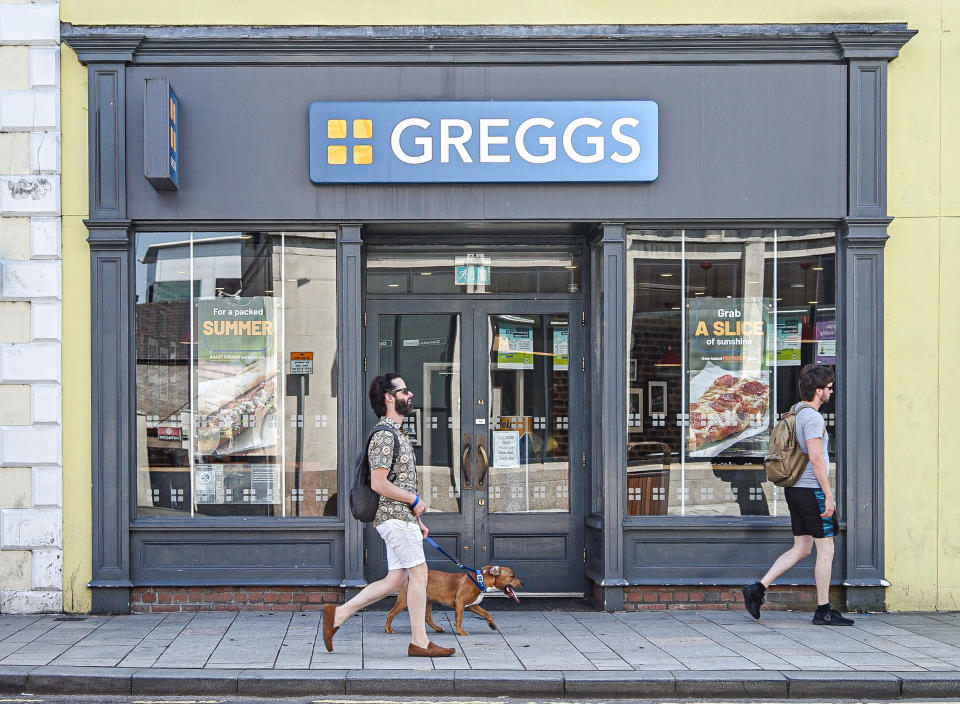UK stocks have been unloved for some time with investors favouring the likes of the US, but data shows there are a number of British companies that have delivered market-beating returns over the past decade.
“The US market has acted like a magnet in recent years and pulled investors away from the UK with the lure of fast-growth technology companies,” said Dan Coatsworth, investment analyst at AJ Bell.
Tech giants, including Apple (AAPL) and Nvidia (NVDA), are part of the “Magnificent Seven” group of stocks that account for a third of the S&P 500’s (^GSPC) market value.
In fact, Microsoft’s (MSFT) market capitalisation of $3.2tn (£2.4tn) is bigger than that of the entire FTSE 100 (^FTSE), which stands at £2.1tn, according to the London Stock Exchange.
As such, these companies have helped drive US market returns, with the S&P 500 up 32% over one year and 91% over five years.
However, Coatsworth said: “A gloomier US economic outlook and rich equity valuations that side of the Atlantic suggests it might be time to add a stronger British flavour to an ISA or pension as the London market is full of stocks on attractive valuations”.
The US Federal Reserve announced a bigger-than-expected 50 basis point interest rate cut last week, its first in four years, signalling to some on Wall Street that the central bank was playing catch up. Fed chairman Jerome Powell said the central bank didn’t think it was “behind” on cutting rates but the Federal Open Market Committee (FOMC) did say in its commentary alongside the rate decision that the “economic outlook is uncertain”.
Looking at the UK market, the FTSE All-Share (^FTAS) — which is made up of the FTSE 100, FTSE 250 (^FTMC) and FTSE SmallCap (^FTSC) indices and totals 561 companies — has generated a 12% over one year and 33% over five years, according to data provided by AJ Bell.
While the UK market more broadly hasn’t quite managed to match US performance, Coatsworth said that “clever stock pickers could have easily smashed” the FTSE All-Share’s returns. He pointed out that just under half of the stocks in the FTSE 350 — comprised of the FTSE 100 and FTSE 250 — have “trounced” its record.
“One third of these UK market-beating stocks haven’t simply had a lucky year,” he said. Analysis by AJ Bell showed 51 individual companies in the FTSE 350 index had beaten the broader UK market in each of the past one, five and 10 years.
Market-beating UK stocks
Food-on-the-go retailer Greggs, is up 32% over one-year and 69% over five years.
“Greggs is a well-oiled machine that’s created a recipe for success,” said Coatsworth.
He said that not only does it sells food and drink at an affordable price and in an efficient manner but it also continues to “innovate and launch new products, keeping existing customers interested and enticing new ones into its stores”.
Read more: Funds set to benefit from falling interest rates
“Greggs is earning more from existing stores by having them open for longer, while at the same time it continues to open new sites,” Coatsworth said. “Behind the scenes, it is reinvesting cash flow into manufacturing, distribution and logistics to support its growth.”
In its interim results released in July, Greggs posted nearly a 14% increase in sales for the period to £961m and a 16% rise in underlying pre-tax profit to £74m.
Supermarket chain Tesco’s stock rose 38% over the last year and 54% over five years.
“Despite operating in a competitive market, Tesco has held onto the top spot in the UK grocery sector thanks to hard work and determination,” said Coatsworth. “Discounters Aldi and Lidl have kept Tesco on its toes and ensured it has never been complacent.”
Read more: London closes gap on New York as top global financial centre
The supermarket’s use of data via transactions using its Clubcard loyalty scheme allows it to gain insights into shoppers tastes and tailor promotions or push products accordingly.
First-quarter results in June, showed sales in the UK and the Republic of Ireland were up nearly 4% like-for-like to £14.3bn.
Premier Foods (PFD.L)
Mr Kipling-maker Premier Foods saw shares climb 51% over one year and 470% over five years.
Coatsworth said the company was once a “zombie” company due to its debt pile but it has since resolved this issue, enabling it to reap the “benefits of investment in the business to make it more competitive and innovative”.
Read more: What are share buybacks?
“Shoppers continue to fill their baskets each week with its brands including Oxo, Bisto, Mr Kipling, Homepride and Paxo,” he said. “Trends come and go, but these brands are true classics and that gives Premier Foods a big advantage over its rivals.”
Premier Foods’ first-quarter results showed group sales of branded products were up 7% on the previous year to nearly £214m.
Bloomsbury Publishing (BMY.L)
Shares in Bloomsbury Publishing have surged 78% over the past year and 203% over five years.
Coatsworth said that the company is “proof that the public still loves a book, despite it feeling as if everyone is always staring at their phones”.
Bloomsbury has benefitted from publishing the likes of the Harry Potter franchise and Sarah J Maas’ big titles, showing it is a “dab hand at spotting talent”.
“It is good at making money from new and old titles, reworking books via new editions and capturing new generations of readers,” said Coatsworth. “It has also done well in the education market, diversifying revenue streams and making the business less reliant on a handful of authors.”
Back in May, the publisher reported that it had achieved its highest revenue and profit in its 37-year history for the year ended 29 February. The company recorded 30% revenue growth at £343m.
BAE Systems (BA.L)
Defence company BAE Systems has been another strong performer on the UK market, with shares up 28% over one year and 142% over five years.
“Russia’s invasion of Ukraine has made governments around the world sit up and think more seriously about defence capabilities,” said Coatsworth.
“That has led to greater spending across the defence spectrum, creating a tailwind for companies like BAE Systems,” which produces defence, aerospace and security solutions.
“Greater cybersecurity spending has also been a tailwind for the UK defence champion as it has the strength to flex both its physical and digital muscles.”
Read more: Top fund picks for self-invested pensions
BAE Systems posted 13% growth in first-half sales last month, at £13.4bn, along with a 13% increase in underlying earnings before interest and tax, at £1.4bn.
Coatsworth said that these star performers on the London market demonstrated that investors “don’t have to choose between the US and UK markets as having a blend of both would help to spread risks.”
He said: “History suggests a portfolio where all the components don’t move in unison can provide a lower-risk experience for investors. Having certain things go up when others are going down means the investor isn’t risking all of their money on one area.”
Download the Yahoo Finance app, available for Apple and Android.












